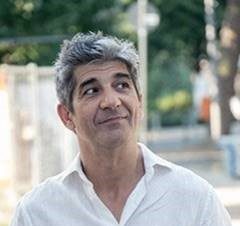Argentina, Literature, 2018
Sergio
Raimondi

When the world changes, literature must as well. This is the credo motivating the thinking and writing of Argentine poet Sergio Raimondi, born in 1968 in Bahia Blanca. A somewhat gruff genius loci inhabits this place: the nearby port of Ingeniero White is one of Argentina’s main seaports; the nation’s most important petrochemical complexes is also located here. But Sergio Raimondi draws his very inspiration from this genius loci: even in his early work Poesía civil (published in German as Zivilpoesie in 2005), Raimondi—who teaches contemporary literature at the Universidad del Sur in Bahia Blanca—examines in depth Argentina’s changing daily reality.
One of the poems is titled programmatically: Poesie und industrielle Revolution [Poetry and Industrial Revolution]. Indeed, this poet is interested first and foremost in the question of how industrialization, and not least also the immigration that accompanied it, has turned against man himself. Visual material drew him to his work also at the Museo del Puerto in Ingeniero White, which is dedicated to the history of industrial dockworkers and where Raimondi served as board director from 2003 to 2011. His work—conceived as a “work in progress”— is therefore closely tied to reality. Raimondi, who is also co-editor of the literary journal Vox Virtual and is responsible for new releases from the publisher Vox in Bahia Blanca, has, since Poesía civil, been regarded as an innovator of Argentinean poetry. His poetry may safely be described as an instrument that, in the sense of a politically engaged poetry, chronicles the constantly changing present in bold notation. In Para un diccionario crítico de la lengua (published in German as Für ein kommentiertes Wörterbuch in 2012) he also leaves behind the radius of the local and opens up his poetic radar to the wide world between Laos and Lebanon, China and Cuba, Hamburg and the South Atlantic. With him the poet becomes a researcher, in accordance with Raimondi’s citing of Brecht—and like all good research, Raimondi’s poetry also proves here to be both curious and full of even-tempered emphasis. Here, vessels carrying mass-produced wares come across Moluskeln and Michel Foucault; population genetics and GM food cultivation encounter migration and trade. Raimondi, who has read both Marx and Max Weber, focuses his attention especially on the tried-and-true: the focal point of his lyrical output is always the poetics of the work itself. It is about the conditions of production and standardized work-processes, about standardization and therefore always about man himself. At times he is a bureaucrat, at times a worker, at times a thinker, at times a consumer—but above all and very gladly so: a revolutionary and an subversive element. Raimondi’s poems are also subversive: kept mostly to long block-like verses and structured in alphabetical order like a lexicon entry, something akin to a humorous resilience still erupts out of them. This begins with the ostensibly dry titles—which tap into intellectual traditions and discourses whose alluring power must be read against the backdrop of the former military regime in Argentina: Internationale, Die or Foucault, Michel. The linguistic register accordingly strides for something beyond the poetic: technical languages and specialist knowledge, legal texts or statistics become here the cool requiems of the global age, in which this poet puts to the test—not without irony—the credits and debits of our overly capitalized world. Raimondi, at the same time a gifted stylist trained in Latin classics, is therefore its chronicler—and critic. To a world in which everything, even literature, threatens to become a commodity, he reproaches the deficits with their own weapons. He cancels out the technical languages simultaneously by pointing out their contradictions; at the same time he explores their phonetic possibilities, pushes them to the extreme and thus explores language itself as the hammer and forge of a possible way of penetrating reality. The title Poesía civil even alludes to this, as you can read in the collection’s instructive epilogue from the pen of Raimondi’s German translator Timo Berger: “In Spanish, civil means, on the one hand, civil in the sense of non-military, but, on the other, points to the sphere of the civilized, of society. A “civil poetry” would therefore be a poetry about society, a poetry of civilization” (Zivilpoesie, p. 98). Raimondi’s poems—translated into German by Timo Berger in a consistently elegant, formal manner, and with the required ear for the intermediate tones embedded therein—are to this extent subversive memories in every respect. “A plea for a sophisticated poetry,” Berger rightly pens in the epilogue to Für ein kommentiertes Wörterbuch (2012), “which simultaneously takes all the literary freedoms that rhetoric and tradition hold ready, couldn’t be more appealing.”
Text: Claudia Kramatschek
Translation: Erik Smith
Zivilpoesie
Poems. Bi-lingual edition. Selected and translated from the Spanish and accompanied by an epilogue by Timo Berger.
Wissenschaftlicher Verlag, Berlin 2005.
Für ein kommentiertes Wörterbuch
Poems. From the Spanish by Timo Berger.
Berenberg Verlag, Berlin 2012.
Zivilpoesie
Short stories. New translation. From the Spanish by Timo Berger.
Hochroth Verlag, Berlin 2017.
Für ein kommentiertes Wörterbuch
II. New Selection. From the Spanish by Timo Berger.
Hochroth Verlag, Berlin 2017.




